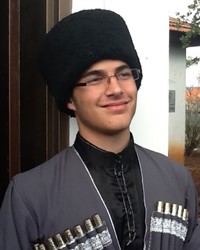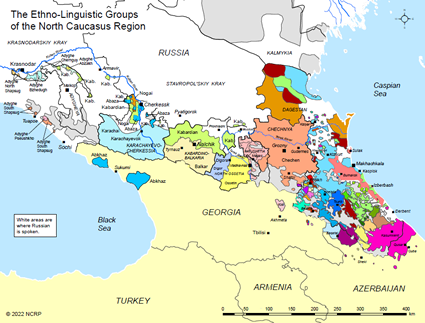The Circassians are the oldest indigenous people of Northwest Caucasus and identify themselves as Adyghe. The Adyghe preserve their culture and continue to use the Adyghe language as their primary means of communication. Only in the 18th century did their language assume a written form. Organized into tribes, the Adyghe have never had an independent state.
Once, the Adyghe were the main ethnic element in the northwest Caucasus; however, this drastically changed under the pressure of the Russian conquest, and especially after the defeat of the Great Revolt (1825-1864), when an Adyghe mass exodus took place. This exodus was called 'one of the greatest mass movements of population in modern history. Adyghe moved to Turkey and other areas of the Ottoman Empire, including Egypt. One and a half million Adyghe abandoned their ancient homeland, leaving behind scattered remnant communities. There are many stories, poems and songs about the victims of the war, the emigration itself and the state of exile. Rituals and memorial days are devoted to these events.
One can gain much insight into Adyghe culture and customs from their folk dances. The dances tell stories about everyday life such as courtship, preparing for war, the harvest, and showing of strength. All stories ultimately originate from the centuries old Nart Epics, a series of 26 cycles and 700 texts dating back to 4,000-3,500 BC. The stories preserve Adyghe ancient history. They precede Greek mythology, containing ancient stories of gods from southern Russia. From these Epics came the " Adyghe habza," or Adyghe traditions.
The habza is an important feature of Adyghe identity. It was established long before their Islamization. It is the Adyghe system of laws, rules, etiquette and ethos. The habza provided the rules of behavior and morality that are handed down in other societies through religion. The Adyghe habza is passed on from generation to generation, with today's Adyghe youth still being taught to carry on the traditions.
There are not many Adyghe people in the United States and most of them arrived between 1820-1920. Many of them were refugees from the Ottoman Empire. These people initially pretended to be Christian since they expected rejection for their Muslim faith. Others came from Syria and Jordan in the 1960s looking for better economic opportunities.
With such a small number within the U. S., the Adyghe blend in with other ethnic groups, often losing their identity. They have been in the U.S. for generations. Each generation loses more of the past and becomes more like the American majority. However, they are maintaining their religious identity as Muslims.
The Adyghe in the U.S. are Muslim. Religious influence upon Adyghe collective identity, both in the past and in the present, has been limited and superficial. Some are very secular, especially those who were born in the United States.
Today, many Adyghe communities worldwide are facing the problems of losing their language and culture. Yet compared to other migrant groups, the Adyghe have a greater tendency to maintain their separate identity.
Pray that believers in the United States will make the effort to lovingly take the gospel to Adyghe people and teach them to disciple others.
Pray that Adyghe-speaking people in the United States will be touched by the gospel and moved to bring it to Adyghe people everywhere.
Pray for a movement to Christ among the Adyghe in the United States and beyond.
Scripture Prayers for the Adyghe in United States.
https://en.wikipedia.org/wiki/Circassian_Americans
| Profile Source: Joshua Project |
| Other PDF Profile |












